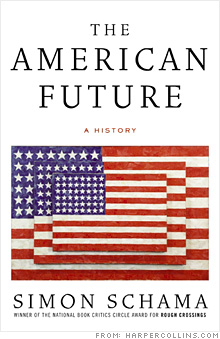History channeler: Simon Schama's 'The American Future'
The Columbia professor has found a novel way to understand America via provocative sojourns through the past.

NEW YORK (Fortune) -- I've just read the most optimistic take on this country's future that I have encountered in years. If that suggests the author is looking at something the rest of us may be ignoring, you're right: Simon Schama has located The American Future (Ecco) deep in the American past.
The book, like some others by the prolific and polymathic Schama, is a companion to a BBC series -- one that hasn't been (and probably won't be) seen on American TV. Filming the series let Schama wander around today's America in a sort of Tocquevillian meander, talking to Virginia fundamentalists, Nevada water-use specialists, Iowa Obamaists, and other inheritors of our collective past. That's the faint foreground of his book; the background resides in the author's surprising excursions through American history.
As Schama sees it, the American experience is a dialogue between our Jeffersonian and Hamiltonian selves -- between altruism and pragmatism. The model of this merger, he argues, was the creation of the U.S. Military Academy. The Jeffersonian side is evident in West Point's role as "a sentinel against, not in behalf of, martial power." The Hamiltonian side blossoms when there's a war to be won. The hero who finds his way through the competing interests is Gen. Montgomery C. Meigs, a Civil War figure of enormous accomplishment but little current renown. Meigs's avatar today is his great-great-great-nephew, also called Montgomery C. Meigs -- a retired Army general who teaches a course at Georgetown on "why Presidents go to war when they don't have to." Score one for Jefferson.
You see what's going on here: Schama addresses immigration by invoking the hostility that Texans had toward newcomers in the third decade of the 19th century -- except that back then Texans were Spanish-speaking Mexicans, and the newcomers were fortune-seeking Anglo �migr�s. He does the same with other topics (religion, consumerism), finding analogs from the past manifested in the present.
Schama's discursive roaming through time and space can seem confusing sometimes (or, worse, arbitrary). He also can get sloppy. For instance, he misquotes the Emma Lazarus poem on the pedestal of the Statue of Liberty. In its context -- a discussion of immigration -- that's like a baseball writer calling Ted Williams a Yankee.
But The American Future, in all its amiable optimism and charming idiosyncrasy, holds rewards for those with a taste for surprise and provocation. At one point Schama celebrates the way religion has been employed in the public sphere to promote noble causes. For a self-described secular humanist, he admits, "this is an awkward historical truth to acknowledge." But, he explains, "history sets such snares to make us think harder." ![]()
-
 The retail giant tops the Fortune 500 for the second year in a row. Who else made the list? More
The retail giant tops the Fortune 500 for the second year in a row. Who else made the list? More -
 This group of companies is all about social networking to connect with their customers. More
This group of companies is all about social networking to connect with their customers. More -
 The fight over the cholesterol medication is keeping a generic version from hitting the market. More
The fight over the cholesterol medication is keeping a generic version from hitting the market. More -
 Bin Laden may be dead, but the terrorist group he led doesn't need his money. More
Bin Laden may be dead, but the terrorist group he led doesn't need his money. More -
 U.S. real estate might be a mess, but in other parts of the world, home prices are jumping. More
U.S. real estate might be a mess, but in other parts of the world, home prices are jumping. More -
 Libya's output is a fraction of global production, but it's crucial to the nation's economy. More
Libya's output is a fraction of global production, but it's crucial to the nation's economy. More -
 Once rates start to rise, things could get ugly fast for our neighbors to the north. More
Once rates start to rise, things could get ugly fast for our neighbors to the north. More







